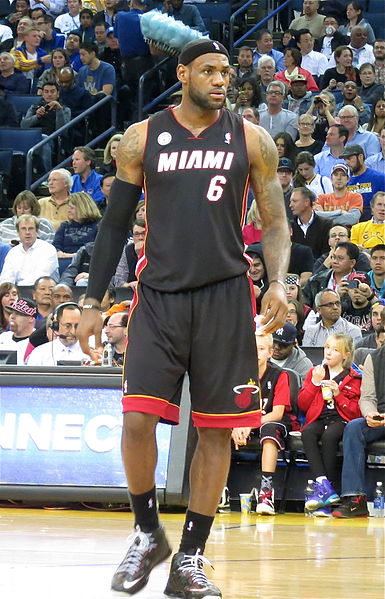Sports Saturday
Miami Heat forward LeBron James recently has been involved in one of the most remarkable streaks in the history of basketball, shooting over 60% and scoring over 30 points in six consecutive games. Thursday evening against the Oklahoma City Thunder he dipped slightly but still managed to so dominate team considered by many to be the NBA’s second best that a second Heat championship seems all but inevitable. In a game last Saturday against the Clippers, at one point he scored 30 points with 11 shots. As the Miami Herald reported it,
James was 9 of 11 from the field, 4 of 5 from three-point range and 8 of 11 from the free-throw line. At one point in the third quarter, he was 8 of 9 overall and 3 of 3 from three-point range after making back-to-back three-pointers, the first of which he converted for a four-point play. It was the stuff of basketball lore.
At times, Lebron appears to toy with opposing teams, who must feel like Lear feels at the hands of fate:
As flies to wanton boys are we to th’ gods [Lebron],
They kill us for their sport.
I am reposting a column written during the playoffs last spring following James’s almost single-handed elimination of the Boston Celtics in game seven. Complimentary though I was, I actually underestimated James when I predicted that his team would be beaten by the Thunder in the finals (see the final paragraph). Instead, James and the Heat won easily in five and, despite Kevin Durant’s skill as a shooter, James has been far more accurate in recent games. This is in addition to his superb passing, his excellent rebounding, and his suffocating defense. He does it all.
Epic Poetry, King James Version (June 16, 2012)
After posting Wilt Chamberlain type numbers to stave off elimination against the Boston Celtics (45 points, 15 rebounds, and 5 assists) and routinely scoring 30+ points in the last few playoff games, LeBron James appears finally to be living up to his self-proclaimed nickname “King James.” I thought therefore I’d have some fun exploring the applicability of that name since it has a literary source.
“King James” would not have punch if it were merely a reference to James I or James II of England or to Jameses I-VI of Scotland. James I (previously the Scottish king James VI) was such a bad king that a modern historian, after having completed a biography on him, sighed, “At last I’m done with that execrable man” (or words to that effect). James II, meanwhile, was so incompetent that he managed to have an entire kingdom unite against him and throw him out (in the “Glorious Revolution” of 1688).
“King James” captures the imagination because it conjures up the King James Bible, one of James I’s few accomplishments. The project took eight years, involved 48 skilled translators, and produced prose that, in the opinion of Victorian hymn writer F. W. Faber, “lives on the ear, like music that can never be forgotten, like the sound of church bells.”
The King James version was composed during the age of Shakespeare when the culture was in love with rich language, and the translators deliberately used archaisms rather than current idioms (as did Edmund Spenser in The Faerie Queene). As a result, contemporary versions can sound bloodless in comparison. I mourn how Elijah now hears (according to the New International Version) “a gentle whisper” instead of “God’s still small voice” and how St. Paul sees “a reflection as in a mirror” rather than “through a glass darkly.” King David no longer says, “Thou preparest a table before me in the presence of mine enemies: thou hast anointed my head with oil; my cup runneth over.”
But back to LeBron. Like the King James Bible, it took eight years and skilled collaborators to put him on a team that would succeed, and now that he is on center stage, he is producing astounding moments that linger in the mind long after the play is over. I’m still marveling over a steal against the Celtics, produced at a dead run, where, to elude the final defender, he passed to teammate Dwyane Wade and then was soaring through the air to receive Wade’s tip return pass and dunk it home.
James now plays with authority, with power, and with poetry. Like the Old Testament Jahweh, he can be a wrathful presence on the defensive end, as Boston’s Rajon Rondo discovered when he tried a fast break lay-up, only to encounter James soaring through the air to deposit both the ball and him amongst the spectators. Yet (to quote the Elijah passage again), James doesn’t only operate out of fire and whirlwind—he can have a surprisingly still small touch when the occasion calls for it. At present, having just won his third Most Valuable Player trophy, he is king of basketball kings as he attempts to take his team to the promised land.
There’s a chance that, like Moses, he won’t arrive there. The Oklahoma Thunder have a remarkable star in Kevin Durant and their bench is deeper and more youthful. Durant dazzles but in a less colorful way. He is an unassuming player in the Tim Duncan mode who is proving to be a more accurate shooter than King James. So let’s call him the New International Version. That’s the version that is prevailing these days.
Previous Posts on LeBron James
Hunger Games a Key to LeBron’s Win


